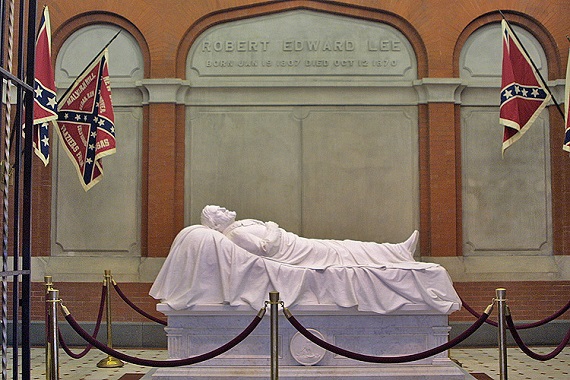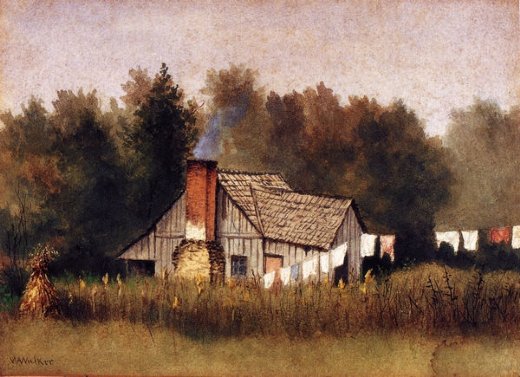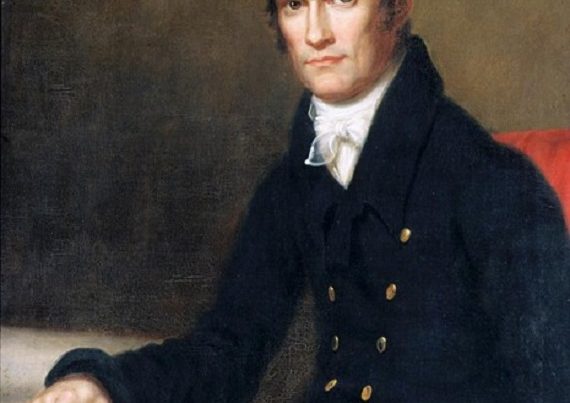
This essay was originally published in the First Quarter 1992 issue of Southern Partisan.
A Review of: General Robert E. Lee and Civil War History (UNC Press, 1991) by Alan T. Nolan
When Frank Owsley sought from among the vast number of interpretations of the cause of the war of 1861 for the principal cause, he defined it as “egocentric sectionalism.” Not slavery, not economics, not confusion about the meaning of the Constitution or the proper relationship of the states to each other and the Federal government, but pernicious pride.
In examining the language of the most vocal Northern crusaders and the most extreme of the Southern defenders in the decades prior to the war, Owsley found a “coarse and obscene” assault by abolitionists on the very integrity of Southern society and institutions. The self-styled Southern fire-eaters responded, of course, but even their “language of insult…was…urbane and restrained” in comparison to “that’ of the Abolitionists. ” Thus, he concluded, “in language of abuse and and insult was jettisoned the comity of sections. And…peace between sections as between nations is placed in jeopardy when one section fails to respect the self-respect of the people of another section.”
In seeking both to define the impetus of Lee Considered and also to review its arguments, implications, and failings, one is compelled to meditate upon the whole tragic course of events—and of the “language of abuse” which precipitated the events—with which the Southerners of 1860 had to contend. Owsley, in surveying the period, located in “egocentricism” the “kind of sectionalism which destroyed unity and divided the nation.”
The most dangerous phase of sectionalism perhaps the sine qua non of the Civil War, was the failure to observe what in international law is termed the comity of nations, and what we may by analogy designate as the comity of sections. That is, the people in one section failed in their language and conduct to respect the dignity and self-respect of the people in the other section.” The reader would be correct in inferring that Owsley attributed to the North the failure of respect which destroyed the comity between the sections.
It is necessary to approach an assessment of Lee Considered by first tending to the insights of the historian Owsley and the methodology of Nolan simply because the,historical imagination and the essence of knowledge as irreducible to a legal brief are conspicuously absent in Nolan’s book. Thus, the reliability of Nolan’s analysis stands or falls on his fidelity not only to the historian’s obligation to enter imaginatively into the context of the time he explores, but to the very manner in which historical truth is to be apprehended. Of this latter point, the chemist -philosopher Michael Polanyi (1891-1976) insisted that the modem quest of “objective knowledge” is futile. In Personal Knowledge, he demonstrated that knowledge is not a science—as Nolan all but explicitly argues—but an art. To truly know requires the exercise of our whole personality, not merely the instrument of our mind. Judged on the basis of these two crucial criteria, Nolan’s case against Lee, and by extension against the South, dissolves into what can only be defined as “egocentric sectionalism.” Nolan applies the method of the legal brief to the four principal aspects of Lee’s public life, or to what ultimately he calls (and condemns as) “the Lee tradition.” In Nolan’s view, the traditional understanding of Lee “constitutes the parable of the war” and, being a parable, obscures rather than discloses the truth about both Lee and the South. Indeed, to Nolan the tradition, being a parable, is false. Thus may readers who believe that parables embody truth more fully than a legal brief recognize at once the profound limitations of Nolan’s historical method. It is by no means an ad hominem to suggest that Nolan betrays the same shortsightedness of an earlier lawyer, the ancient Nicodemus, whose rationalistic methods also failed him when confronted by a personage (who “never spake except by parable”) who was incapable of being understood by the merely technical procedures of the court.
Assured of the all-sufficiency of his method, Nolan examines, first, Lee’s convictions concerning slavery and actually the whole matter of Negroes in Southern life; second, Lee’s convictions regarding Unionism and sectionalism, respectively; third, Lee’s generalship, both in its strategic conception and in its tactical execution; and, fourth, Lee’s postwar convictions and conduct. To Nolan, the “Lee tradition” holds that Lee was opposed to slavery, opposed secession, was a brilliant commander, and, after the war, fostered national reconciliation. It is Nolan’s contention that this tradition is false in each of its four regards.
Applying his either/or method with a fearlessness, and a recklessness, that vitiates its usefulness in the quest of historical truth, Nolan argues that because Lee believed abolitionism was insane religiously, socially, and politically, ipso facto, Lee celebrated slavery as a positively and permanently just arrangement. Here is Lee’s own language, as Nolan himself cites it: “Considering the relation of master and slave, controlled by humane laws and influenced by Christianity and an enlightened public sentiment, as the best that can exist between the white and black races while intermingled as at present in this country, I would deprecate any sudden disturbance of that relation unless it be necessary to avert a greater calamity to both.” From this observation, in Lee’s letter to Virginia State Senator Andrew Hunter, Nolan construes Lee to be an advocate of slavery. How to respond to such a charge, except by demonstrating the fundamental error of Nolan’s approach to the study of history? For example, J. H. Plumb, probably the most widely-read historian of our time, in reviewing the magisterial Slavery and Human Progress by David Brion Davis, reminds readers of today that “revulsion [to slavery] is now so generally felt that it is hard to remember that until the late eighteenth century, slavery, except for a few intellectuals, had been acceptable to all societies and practised by most of them since the dawn of history.” Robert E. Lee had not the luxury of intellectual speculation. He lived in a particular time in a particular place, and no one then had the answers to slavery, as no one today has the answers to a whole host of public problems. Lee was no advocate of slavery. He was, rather, incapable of advocating (or even of countenancing) the smug Northern denunciation of Southern life simply because Southern life could conceive of no arrangement other than agricultural slavery (as contrasted to the “wage slavery” even Northern factory workers decried) as a means of accommodating 5 million Negroes in the midst of 4 million whites.
Nolan bases so much of his consideration of Lee on slavery that a whole book could be written in response to the mistakes of his method. For example, he ignores altogether the intellectual history which accounts for the sudden rise of “Unionism” as America’s peculiar expression of the utopian ideologies of the era. It was against that ideology, not for slavery, that Lee and his generation fought. So much for Nolan’s too-certain and too-simple declaration that “Slavery…was what the war was all about.” Thus the vaunting confidence of “egocentric sectionalism.” Nolan’s remaining contentions are of no more substance. Painstakingly he scours Lee’s letters especially of 1860-1861 in search of evidence able to damn Lee as a sectionalist, not a Unionist. “Surely,” Nolan concludes, “it is plain that Lee was a Southerner harboring Southern…feelings.” Thus does Nolan equate Southern feeling with damnableness. Thus does his method fail to appreciate that the son of Light Horse Harry Lee of American Revolution convictions could believe that fidelity to those same convictions a generation later required his defense of Virginia and her sovereign sister states against the Yankee elite and its Federal might.
Third, Nolan argues that Lee was incorrect in his “sense of grand strategy in regard to his own army.” In the classic fashion of the sidewalk superintendent, Nolan casts about in the literature of those who questioned or even criticized Lee’s generalship for evidence that Lee was foolish, even murderous, in fighting till Appomattox and even then wishing he had time and troops to continue the war. Nolan’s ambition is not so much to diminish Lee’s stature as a strategist; after all, disputing the General’s strategies and tactics has always been a legitimate enterprise, and Lee himself wished only to be understood as to be fighting as best he could with the means at his disposal. No, Nolan purports to find in Lee’s acknowledged “devotion to the offensive” and his “daring” an indication that Lee fought to win, fought unwisely, and should have surrendered long before ’65. So much for the reasoning of an historian for whom numbers alone apparently should dictate a commander’s course of action.
Fourth, and finally, Nolan argues that Lee after the war was no conciliator, but, rather, maintained till his death in 1870 the convictions that impelled him to war a decade before. Some criticism. Specifically, Nolan charges (and by implication condemns) Lee for maintaining that secession was legitimate under the Constitution of 1787, that Southern civilization was superior to the alternative up North, and that white Southerners should not hand over society and government to suddenly-free Negroes. On Lee and his generation, albeit with “Northern complicity,” Nolan lays the blame for “a hundred years” of the “suppression” of black people.
Here the essential ingredient,—egalitarianiam of the French fashion—of Nolan’s method emerges to full view, and here he discloses the entire purpose of his study. That purpose is to deny any aspect of right to Lee as a man and the South as a nation. To Nolan, Lee considered is Lee a legend, not a virtuous man. To Nolan, the legend of Lee as the representative of a noble but temporarily misguided South has been sustained by generations of historians, and embraced by the North, as a means of eliminating the differences that led to the war, and to the consequences of the war, so that the reunited country could pursue an all-white national agenda. To Nolan, the legend of Lee as the archetypal Southerner has “deprived…the nation as a whole of any high purpose for the war,” because to Nolan, that purpose obviously was “equalitarian,” and so centered upon the abolition of slavery and the elevation of Negroes to full social and political equality with whites. “Only recently have unemotional and nonracist eyes sought to look behind it,” Nolan proclaims of the Lee tradition and, apparently, of his own “unemotional and nonracist” self.
Nolan devotes his “unemotional and nonracist” attention also to the place of honor in Southern life, and so to the “motivation” of Lee’s “combative persistence” in face of “the inevitability of his final defeat.” Citing James McPherson, Nolan reflects on “the tragic irony” that, in striving “to preserve its way of life…the South was not only invaded and conquered, it was utterly destroyed.” To Nolan, principles and actions which lack “a military purpose [can] have no political purpose. Thus they are without any rational purpose.” It apparently does not occur to Nolan (or, actually, to McPherson) that honor transcends military, political, or rational purposes, and that whole nations have over the course of centuries preferred extinction to dishonor. As a more perceptive historian, Pierre Bourdieu, has observed of the Berber tribesmen of Algeria, “He who has lost his honor no longer exists.” Robert E. Lee confessedly lost his part of the war for Southern independence; he never, lost his honor. The same may be said of hosts of other Southern soldiers, and of the South itself.
Lastly, Nolan observes that “Northerners’ own fear and dislike of blacks helped persuade them that they surely would not have caused such a fuss about a little thing like the status” of blacks in the South. To Nolan it is unthinkable that the Yankee crusaders of 1861 did indeed let loose a conflagration upon the land for reasons having nothing to do with slavery. He evidences no attention to the analyses of nineteenth-century life which suggest that American life in the Northern states was in thrall to ideologies of revolutionary “reform” let loose by the secularizing forces of the French Revolution and compounded by intellectual currents dating to the Enlightenment and ultimately to the Renaissance. The conservative counterweight of the South had to go; it was not allowed to go peacefully because utopian zeal knows no rest, and would rather lay waste a competing civilization than accommodate the frustrations of imperfection.
Nor does it occur to Nolan that devotion to the original republic, subordination to the constraints on Federal power in the Constitution, and a social accommodation of the mysterious inequities of life are intellectually credible and morally respectable positions not to be confused with racism.
Of the countless historians of the era whose work could have illumined Nolan’s analysis, and prevented him from simplistic conclusions, Lord Acton, Sir Herbert Butterfield, R. G. Collingwood, and Eric Voegelin may be named. Each warns against imposing upon the past the neat moralisms of the present. Collingwood, for example, in his The Idea of History, reminds us that an historian must be able “to enter with equal sympathy into the essential features and values of each way of life” in the past which is the subject of his scrutiny. This Nolan manifestly does not accomplish. The whole host of issues, social, political, intellectual, and religious, central to the nineteenth century throughout the Western world are reduced in Nolan’s analysis to slavery and racism, principally in the South, less so in the North. Nolan does chide his own section, and even his section’s most tortured representative of the epoch, Abraham Lincoln. But he maintains his thrust that Northern opposition to slavery, Southern defense of slavery, was the crux.
It was, in Nolan’s judgment, “the slavery paradox” that contradicted “the promise of which all Americans were inordinately proud and the [actual] performance of their republic.”
J. H. Plumb has addressed this paradox in a review of Edmund S. Morgan’s monumental American Slavery, American Freedom:
“One of the great conundrums of American history is how could Jefferson write the Declaration of Independence… whilst he was depriving two hundred slaves on his own estates of precisely those rights?…Yet in spite of this glaring contradiction, it would be absurd to accuse Washington. Jefferson, Madison, and the rest of the Virginians who fought for independence and subscribed to the Declaration, of self-conscious hypocrisy. They believed passionately and sincerely in the rights of men, but equally they could not conceive of a Virginia without slavery. [But] attitudes to slavery [can] be understood only in the context of poverty and of the exploitation of labour;…the Elizabethan poor, flogged, branded, forced to work, were the source from which American attitudes to slaves were derived, not racism.” Only long decades later, after the harsh conditions of the colonial frontier had assuaged exploitation of the poor both white and black, did racism enter the equation—and “it was an ingredient, not a cause” of slavery, having the character rather of a rationalization of the institution itself, not the institution’s purpose, Plumb advised. Of such are the imperfect circumstances in which honorable men and women must make imperfect choices. Nolan might have been sobered in his consideration of Lee also by tending to the work of V. Jacque Voegeli, who in Free But Not Equal reminds us that “Race prejudice was particularly direct and forceful in the Hoosier State”—that is, Nolan’s own Indiana: “In November of 1862 a regiment of Indiana soldiers prevented a group of [Negro] fugitives from slavery from crossing the Ohio River into Indiana, shouting that ‘they would fire upon them; that their object in going to war was not to make Indiana an asylum for negroes’.”
It was, we must remember, a flawed and tragic era. Ours is no less flawed and no less tragic, and, though the circumstances have changed, the choices are no less torturous. By imposing upon his subject—Robert E. Lee of Virginia—a standard impossible even to the Hoosiers let alone the Southerners of I860, Nolan succumbs to one of the principal temptations of our time: evaluating the moral worth of past generations against the sole criterion of a concept of equality .
The task “of judging the value of a certain way of life taken in its entirety is an impossible task,” according to Collingswood, yet it is precisely the task that Nolan claims to have mastered in pronouncing his verdict against Lee and the South. But even such an attempt, Collingswood warned, “is an infallible way to generate illusions” and it is a method that “is not and never can be historically true.” Indeed, “It tells us much about the historians who study the facts, but nothing about the facts they study.”
In the last analysis, then, Nolan has given us, not a consideration of Lee, but an exposition of his own vaunted attempt intellectually to grasp the whole complex of a historical phenomenon by viewing it through the lens of the ideology of Progress, and focused on the single (and also complex) matter of slavery and race. It is an engaging, but ultimately a failed and even frustrating, attempt, and would better be entitled Nolan Considered, by Robert E. Lee.





